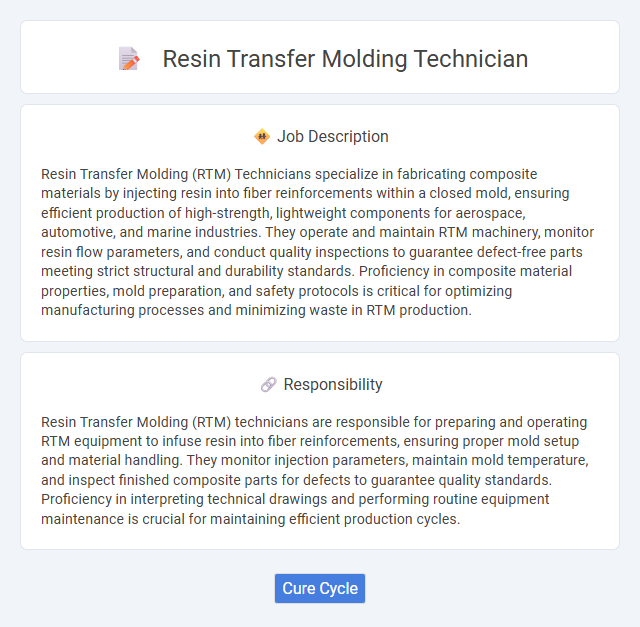
Resin Transfer Molding (RTM) Technicians specialize in fabricating composite materials by injecting resin into fiber reinforcements within a closed mold, ensuring efficient production of high-strength, lightweight components for aerospace, automotive, and marine industries. They operate and maintain RTM machinery, monitor resin flow parameters, and conduct quality inspections to guarantee defect-free parts meeting strict structural and durability standards. Proficiency in composite material properties, mold preparation, and safety protocols is critical for optimizing manufacturing processes and minimizing waste in RTM production.
Individuals with strong attention to detail and good manual dexterity are likely suitable for Resin Transfer Molding technician roles. Those comfortable working in manufacturing environments where precise handling of materials and adherence to safety protocols are required may find this job fitting. It is probable that candidates who enjoy hands-on tasks and problem-solving in a controlled production setting will thrive in this position.
Qualification
Resin Transfer Molding (RTM) technicians require specialized knowledge in composite materials, including expertise in resin systems and mold preparation. Proficiency in operating RTM equipment and understanding of curing processes are essential to ensure quality production. Relevant qualifications often include a technical diploma or certification in composite manufacturing, along with hands-on experience in resin transfer molding techniques.
Responsibility
Resin Transfer Molding (RTM) technicians are responsible for preparing and operating RTM equipment to infuse resin into fiber reinforcements, ensuring proper mold setup and material handling. They monitor injection parameters, maintain mold temperature, and inspect finished composite parts for defects to guarantee quality standards. Proficiency in interpreting technical drawings and performing routine equipment maintenance is crucial for maintaining efficient production cycles.
Benefit
Resin transfer molding technicians likely enjoy benefits such as hands-on experience with advanced composite manufacturing processes, which can enhance their technical skills and career prospects. The role probably offers opportunities for stable employment within aerospace, automotive, or industrial sectors undergoing growth in composite material use. Competitive wages and potential for career advancement may also be part of the compensation package for skilled technicians in this specialized field.
Challenge
Resin transfer molding technicians likely face challenges related to precisely controlling resin flow and curing times to ensure defect-free composite parts. Variability in material properties and equipment conditions probably increase the complexity of maintaining consistent production quality. Troubleshooting issues such as voids and incomplete mold filling is expected to demand strong problem-solving skills and attention to detail.
Career Advancement
Resin Transfer Molding (RTM) technicians develop specialized skills in composite manufacturing, enabling progression to senior technician, process engineer, or quality control specialist roles. Mastery of RTM machinery and materials science enhances opportunities for leadership positions within aerospace, automotive, and marine industries. Continuous training in automation and materials innovation drives career growth and higher earning potential in advanced manufacturing sectors.
Key Terms
Cure Cycle
Resin Transfer Molding (RTM) technicians expertly control and monitor the cure cycle to ensure optimal polymerization and part quality. Precise temperature, pressure, and timing management during the cure cycle minimizes defects such as voids and incomplete resin flow. Mastery of cure cycle parameters directly impacts the mechanical properties and dimensional stability of composite components.
 kuljobs.com
kuljobs.com